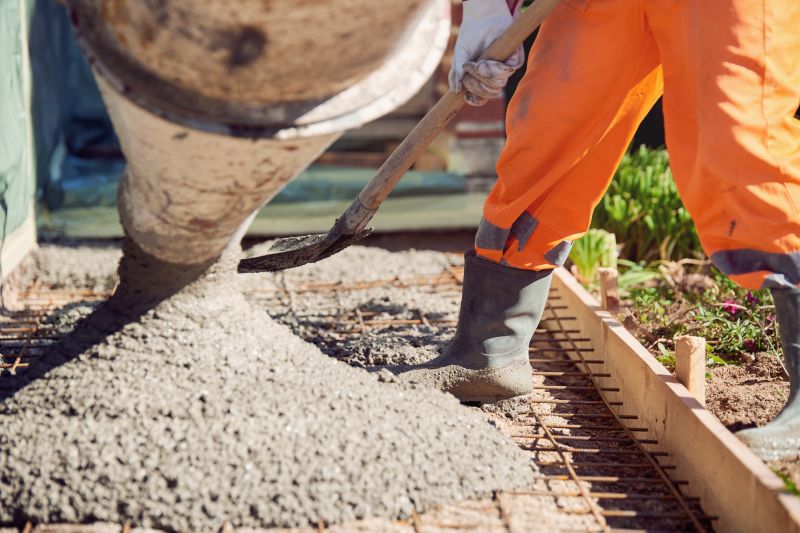Leading Supplies for Efficient Concrete Installation Work
Upgrade your toolkit with top-performing products designed to deliver precision and durability in concrete projects.
 Products designed for concrete installations encompass a wide range of tools and materials that facilitate the successful placement, reinforcement, and finishing of concrete structures. From initial mixing and pouring to curing and finishing touches, these products are essential for achieving durable and high-quality concrete work. Proper selection of these items ensures that projects are completed efficiently, safely, and with the desired results. Whether working on small residential projects or larger commercial constructions, understanding the variety of available products can help in making informed decisions tailored to specific needs.
Products designed for concrete installations encompass a wide range of tools and materials that facilitate the successful placement, reinforcement, and finishing of concrete structures. From initial mixing and pouring to curing and finishing touches, these products are essential for achieving durable and high-quality concrete work. Proper selection of these items ensures that projects are completed efficiently, safely, and with the desired results. Whether working on small residential projects or larger commercial constructions, understanding the variety of available products can help in making informed decisions tailored to specific needs.
Top Overall Option
Concrete Reinforcement Mesh
Concrete reinforcement mesh is widely used to provide added strength and crack resistance in various concrete applications. It is versatile, easy to install, and compatible with many project types, making it a reliable choice for both professionals and DIYers. Proper placement of reinforcement mesh can contribute to the durability and stability of concrete structures, especially in load-bearing or high-stress environments.
Types of Products For Concrete Installations
Concrete Mixers
Portable or stationary mixers are used to prepare consistent concrete batches on-site for various projects.
Rebar and Steel Reinforcements
Rebar and steel mesh provide structural support and help prevent cracking in concrete slabs and walls.
Formwork and Molds
Formwork products shape and support poured concrete until it gains sufficient strength.
Concrete Vibrators
Vibrators help eliminate air pockets and ensure proper compaction of concrete.
Finishing Tools
Tools like trowels, floats, and edgers are used to smooth and shape the surface of concrete.
Curing Compounds
Products that retain moisture and promote proper curing for concrete strength development.
Sealants and Surface Protectors
Sealants protect concrete surfaces from water, stains, and wear over time.
Expansion Joints
Joints that accommodate movement and prevent cracks caused by temperature changes.
Form Release Agents
Agents that facilitate the removal of forms without damaging the concrete surface.
Concrete Colorants and Stains
Products that add decorative color and aesthetic appeal to concrete surfaces.
Concrete Cutting and Drilling Equipment
Tools for precise cutting, drilling, and modifying finished concrete surfaces.
Protective Gear
Safety equipment such as gloves, goggles, and masks for worker protection.
Popular Choices
Sealers are commonly used to protect concrete surfaces from stains and moisture.
Supports that hold reinforcement in place during pouring and setting.
Tools used to create clean, rounded edges on concrete slabs.
Blankets that help retain moisture and temperature for optimal curing.
Essential for detailed finishing and smoothing of concrete surfaces.
Used to clean and prepare concrete surfaces before sealing or staining.
Vibrating plates assist in compacting large volumes of concrete efficiently.
Materials that fill gaps and allow for movement in concrete structures.
Coloring products used to add decorative effects to concrete surfaces.
Waxes that facilitate form removal and produce smooth concrete surfaces.
Machines used to smooth and level concrete surfaces after curing.
Sealants that provide clear, durable protective coatings for concrete.
Power tools designed for precise cutting of hardened concrete.
Products used to repair cracks and surface damage in concrete surfaces.
Concrete installation often begins with the preparation of the site and mixing of the concrete. This involves the use of mixers, shovels, and wheelbarrows to handle the raw materials. Once poured, reinforcement products such as rebar and wire mesh are employed to add strength and stability to the structure. Finishing tools like trowels, floats, and edgers are used to achieve smooth surfaces and precise edges. Additionally, curing products and sealers help in maintaining the right moisture levels and protecting the concrete from premature wear. Each stage of the process benefits from specialized products designed to enhance efficiency and results.
Safety and durability are paramount in concrete work. Protective gear such as gloves, goggles, and masks are essential for worker safety. Meanwhile, products like form release agents and expansion joints aid in preventing cracks and ensuring the longevity of the finished structure. For decorative concrete projects, stain and coloring agents are available to add aesthetic appeal. With a broad spectrum of products catering to different aspects of concrete installation, professionals and DIY enthusiasts alike can find suitable options to meet their project requirements. Properly selecting and utilizing these products can significantly impact the overall quality and durability of concrete structures.
Key Buying Considerations
- Determine the specific application and project scope to select appropriate products.
- Consider the strength and durability requirements for the concrete structure.
- Evaluate compatibility of reinforcement materials with the concrete mix.
- Choose finishing tools that match the desired surface texture and smoothness.
- Assess curing and sealing products based on environmental exposure and longevity needs.
- Ensure safety equipment is suitable for the scale and nature of the work.
- Account for ease of use and installation when selecting formwork and support products.
- Review product specifications for compatibility with existing tools and materials.
- Identify whether decorative options like stains or colorants are needed for aesthetic goals.
- Check product reviews and ratings for insights on performance and reliability.
- Consider environmental conditions such as temperature and humidity that may affect curing.
- Select appropriate joint fillers and expansion materials to accommodate movement.
- Factor in project timeline and budget to balance quality and cost.
- Verify that products meet local building codes and standards.
- Look for versatile products that can be used across different types of concrete projects.
